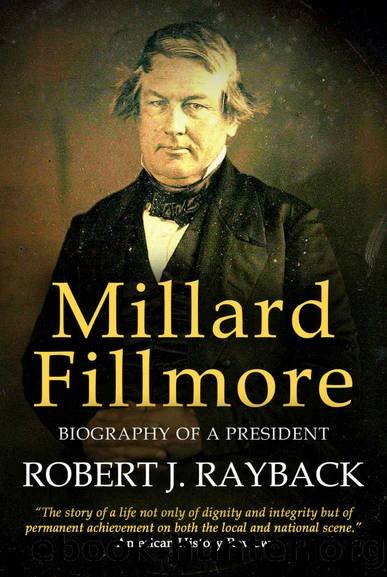Millard Fillmore
Millard Fillmore: Biography of a President by Robert Rayback
Tier 5
Writing a book is hard work, and writing a book on Millard Fillmore doubly so. As such, I’m not trying to give Mr. Rayback a hard time, but this book was not good.
I know I’m a bit of a broken record on this, but one of the primary joys of this project is learning about who a president was before they took office. In the best biographies, one learns about their family and early life. The author sets a scene for you of the president as a young man, and that scene influences your later understanding of them as president.
Now, certainly, some biographies use a different tact. Mecham’s biography of Jackson comes to mind as one that focuses primarily on his presidency.
Rayback chose to do neither. We do not learn much about Fillmore as a young man or about his family, nor do we get a deep dissection of his presidency. Instead, much of this book is devoted to a history of the Whig party and a description of its ultimate demise. I understand how this is a tempting angle with which to approach Fillmore. He was, after all, the last president of that party, but that is hardly a biography.
If Mr. Rayback wished to write a book on the history of the Whig party, I’d be interested in that. But don’t write half a biography and half a history of that party. It causes the book to be confused and uneven.
Now, as for Fillmore. His early life has the potential to be interesting. He was born into poverty near the Finger Lakes, with his parents working as tenant farmers. He didn’t have much formal schooling but managed to become a lawyer. He then rose through Buffalo politics to the New York Assembly and eventually the House of Representatives. His career is similar in some ways to Martin Van Buren's. He was a party stalwart but not remarkable by any means. He was often overshadowed by his fellow New York Whig, William Seward. Seward would, of course, go on to later prominence in Lincoln’s famous cabinet of rivals.
He was an afterthought as Vice President and inherited a crisis upon Taylor’s death. The Southern states were on the verge of secession, and where Taylor had opposed the Compromise of 1850, Fillmore went along with it.
The Compromise of 1850 is the ultimate kicking the can down the road act. It admitted California as a free state but also passed the Fugitive Slave Act, one of the most despicable acts in American history. Fillmore heralded the compromise as a final settlement in the slavery issue, but surely even he couldn’t have believed that. There were vast swaths of territory still waiting to be admitted as states, and when they did, the debate would start back up.
There are some differing historical opinions on The Compromise of 1850. Some say the Civil War was inevitable, and this compromise simply stalled it (I fall into this camp). Some say that this was the last act of North/South diplomacy headed by key legislative figures (Clay, Webster, and Calhoun notably), and their deaths and subsequent loss of this kind of diplomacy caused the Civil War. Still, others argue that the compromise itself is to blame. They claim that the Fugitive Slave Act exacerbated tension and further entrenched the sides.
Anyway you slice it, Fillmore didn’t help things.
The one positive thing I can say about Fillmore is that he destroyed the Whig Party. It’s not that I dislike that party, but its disintegration allowed the Republican Party to form. This splintering of the party system in the United States and the increasing tensions over slavery led to Lincoln’s unlikely election. Fillmore didn’t intend any of this, but Lincoln was the most important figure in US history and needed to be president when he was. That wouldn’t have happened if it hadn’t been for terrible presidents like Fillmore.
His later life is further mired in failure and disrepute. He did not secure his party’s nomination in the next election and later, following the disintegration of the Whig party, ran on the awful, nativist Know Nothing ticket (if you want some terrible reading on the xenophobic populism of the pre-war years, look up the Know Nothings). He then, as if he was intent on always being on the wrong side of history, supported Andrew Johnson’s awful, racist Reconstruction Policies.
All in all, he was a bad president, but a bad president does not always make a bad book. Unfortunately, here we had both. (Sorry, Mr. Rayback)
